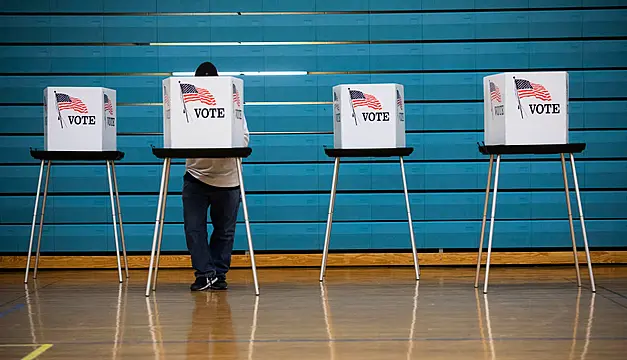A large global survey issued on Friday showed a surge in despair and disillusionment with established politics, particularly among young American men, the only US population group to turn more conservative over the past decade.
The study by the international research agency Glocalities, shared with Reuters, offered context for November's US presidential poll and a plethora of votes worldwide, including a European Union parliamentary election in June.
It surveyed respondents to determine their position on a scale on a scale of optimism between 'hope' and 'despair', and on another between 'control' and 'freedom' – in other words, conservatism and liberalism.
On average, the world became more liberal between 2014 and 2023, even as it became more pessimistic, according to more than 300,000 surveys in 20 countries representing nearly 60 per cent of the global population.
Young people the world over feel especially let down by society, said Martijn Lampert, head of research at Glocalities, adding that "the surge in despair among young adults in the US far outweighs the rise in despair among young adults in EU countries".
Most strikingly, young US men were the only population group in the United States or seven EU member states actually to have become more conservative since 2014 – or, in the poll's terms, to favour more control rather than freedom.
In total, 14,526 Americans were polled between 2014 and 2023, including 2,242 men aged 18-34.
Worldwide, "feelings of hopelessness, societal disillusionment and rebelling against cosmopolitan values partly explain the rise of radical right anti-establishment parties", Lampert said, citing elections in several European countries.
Social media algorithms were magnifying the trend by drawing "moderately conservative young men towards more extreme and radical conservative male role models and world views".
Young women 'the most liberal in history'
The report also highlighted a sharp difference between the world's young men and young women.
Both were worried about career prospects, financial security and education but while men aged 18-24 overtook men aged 55-70 as the most socially conservative group, women of 18-24 grew more liberal and anti-patriarchal.
On a scale where 1 represents the most conservative and 5 the most liberal, women worldwide aged 18-24 moved from 3.55 in 2014 to 3.78 in 2023 - both easily the highest for any age group.
Men of the same age moved from 3.29 to 3.36. And in the U.S., men of 18-34 became less liberal, dropping from 3.48 to 3.46.
"Globally young women are likely the most liberal group in human history," the report said.
Young women were worried above all about social issues such as sexual harassment, domestic violence, child abuse and neglect.
Young men were more geared towards achieving social and economic status, and set store by conservative family values and competition, bravery and honour.
If the report offered a glimmer of optimism, it was among the world's men and women over 55, the only groups to become generally more hopeful over the decade, as well as more liberal.
Respondents were asked 43 questions to assess where they ranked.
To gauge social values, Glocalities assessed their views about patriarchy, gender role flexibility, same-sex marriage and cohabitation before marriage.
The measurement of sentiment focused on future prospects and feelings about being let down by society.
Surveys were conducted in Australia, Belgium, Brazil, Canada, China, France, Germany, India, Italy, Japan, Mexico, the Netherlands, Poland, Russia, South Africa, South Korea, Spain, Turkey, Britain and the US.







